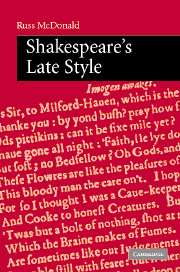3 - Syntax (I): divagation
Published online by Cambridge University Press: 22 September 2009
Summary
Not that Cymbeline is a lucid play; its language prevents it being that.
Frank Kermode“I have observed,” wrote the linguist H. C. Wyld in 1919, that syntax is one of those “branches of English studies which many people consider important for somebody else to tackle.” Reluctance to generalize about verbal arrangement, even the fundamental conventions of word ordering, has persisted in the community of linguistic scholars and grammarians, and literary critics have partaken of their colleagues' diffidence, thanks in part to the additional complications deriving from the conditions of poetry and drama. If experts hesitate to address the topic of word order in basic speech, expository writing, or prose narrative, then the dearth of commentary about the syntactical properties of Shakespearean blank verse is easily pardoned.
The challenge is especially formidable in confronting the late plays, experts and beginners alike having concurred that the highly complicated syntax of the poetry constitutes one of its most perplexing features, perhaps the major obstacle to comprehension and appreciation. Meaning often seems hampered by circumlocution, capricious placement of words and larger verbal units, starts and stops, and consequent semantic obscurity. The syntax of this phase resists precise description because it encompasses so many different forms: short sentences and long sentences; hypotaxis and parataxis; ordinary conversation and emotional outbursts; inversions and inverted inversions; omission and pleonasm; simplicity and artifice. Moreover, the potential difficulties of the syntax are magnified by the effects of ellipsis described in the preceding chapter.
- Type
- Chapter
- Information
- Shakespeare's Late Style , pp. 108 - 148Publisher: Cambridge University PressPrint publication year: 2006



